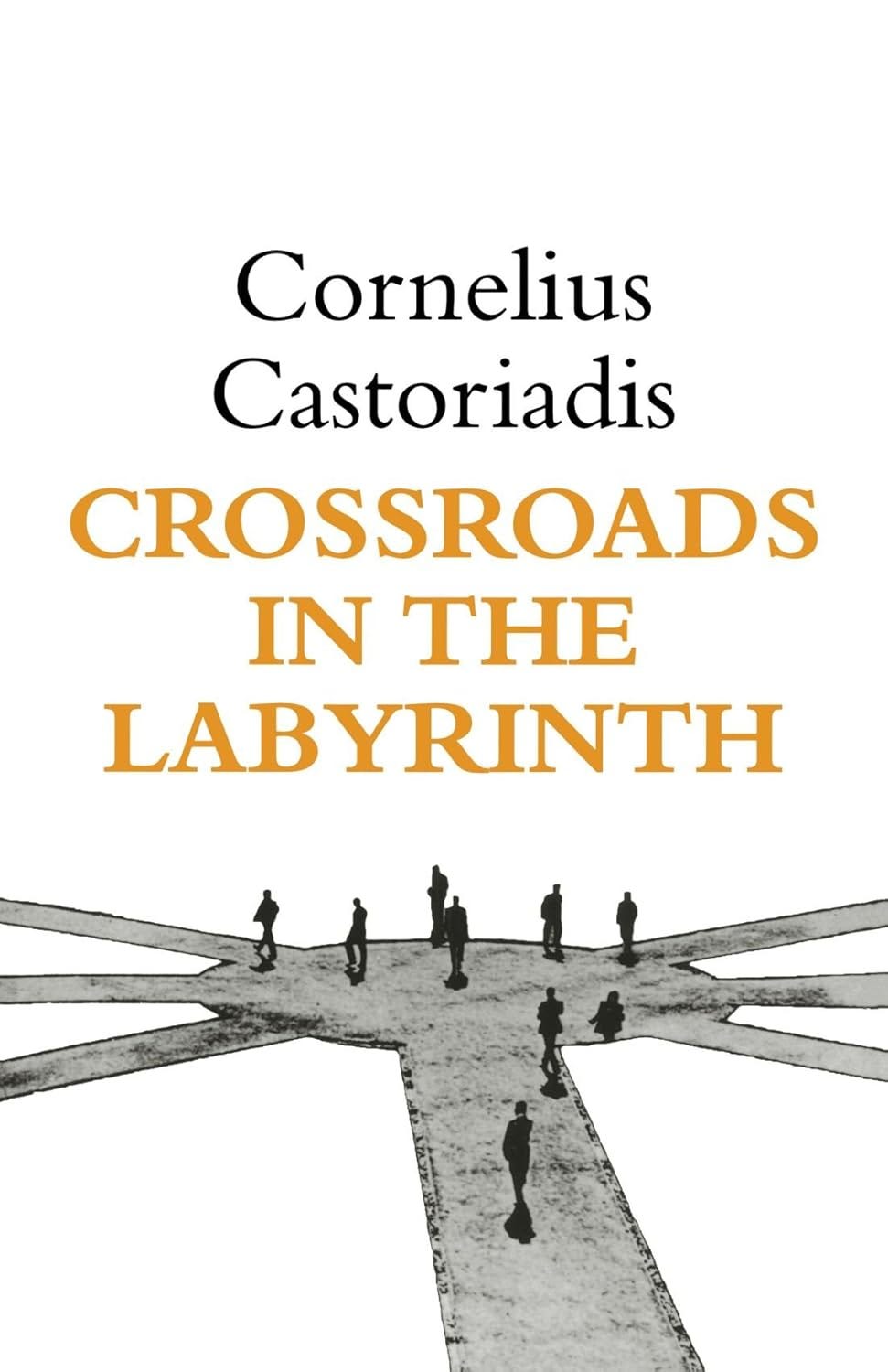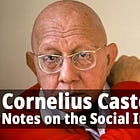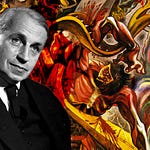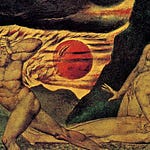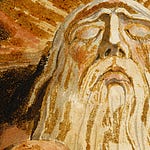Blake saw imagination as the ‘body of Christ’, as divine: imagination is what will build Golgonooza, his New Jerusalem. Some readers of Blake interpret this imagination as merely the power that allows the artist to make inspired art. It is far more than this in Blake, where the imagination is tasked with building God’s Kingdom itself. But what can this mean?
Cornelius Castoriadis (1922-1997) was a child of the post-war revolutionary movement. He led the group Socialisme ou Barbarie (Socialism or Barbarism), which split to the left of French Trotskyism and was active from 1948-1966. Castoriadis eventually rejected Marxism, based on his belief in the power of the collective social imaginary to create social forms (languages, institutions, social relations), symbolic artefacts and entire societies. Could this social imaginary, able to create ex nihilo and overturn all categories, be the divine body of the imagination Blake envisioned?
In this podcast, Andy Wilson talks to Joe Ruffell about Castoriadis and the imagination, taking in topics including:
Castoriadis’s political history and his development beyond Marxism
the role of imagination in Blake
Castoriadis’s account of the history of the concept of the radical (esemplastic) imagination from Aristotle to Kant, Heidegger and beyond
Castoriadis and Primary Narcissism
State Capitalist groups to the left of Trotskyism in the 60s New Left
worker’s power against Lenin and Taylorism
the later Castoriadis’s idea of the interregnum, and of the power of the imagination to entrap and beguile
Coleridge versus Wordsworth on the imagination, and the esemplasm
Castoriadis’s ecological and anti-oppression politics
Castoriadis’s imagination versus Marxism
the debate between Castoriadis and Alasdair MacIntyre (the latter speaking for the International Socialists before becoming a Catholic Aristotelian)
democracy in the Greek polis and elsewhere
the curse of the imagination
Notes for a future podcast: Does the radical duality of Castoriadis’s imagination – its power both to liberate and enslave, and the slippery dialectics between those states – resemble the arrangements in Blake’s Marriage of Heaven and Hell?
Andy Wilson, Joe Ruffell: Blake, Castoriadis and the Social Imaginary
Andy Wilson: Hello, everyone. It's Andy Wilson with you for the Traveller in the Evening, in our latest podcast. Tonight, we're going to be talking about William Blake, Cornelius Castoriadis and the social imaginary. I'll explain the title before we start, and why it's of interest.
My guest tonight is an old friend of mine, Joe Ruffell. Joe is currently researching his PhD in aspects of communism in Albania which is a fascinating topic, and maybe we'll get him back on the podcast at some point to talk about it. But before I bring Joe in, I first of all want to sort of set the scene and say something about why I thought the topic is - well, it's certainly of interest to me, I hope it's of interest to you - but why it's of interest to me. That's to do with how I've engaged with William Blake.
I started studying Blake some years ago, and as I dived more deeply into him I found I was becoming essentially a Blakean. I was beginning to see the world from what I understood to be Blake's point of view. A key attraction of Blake for me is the radicalism of his thought, the radicalism of his politics. But in terms of his ideas generally, a key notion of his is about the imagination. In a sense - and I don't mean this in any precise way - but in a sense, the imagination fills a space in Blake's thought which would have been filled by politics in other people's thought.
Blake talks about imagination, and the exercise of the imagination, as the essential part of the work of building Golgonooza, his New Jerusalem. His alter ego within his mythology, Los, exercises his imagination in building Golgonooza, his new republic. So the imagination is vital to Blake. But at the same time, there are a lot of Blakeans, a lot of people interested in the work of Blake, who understand the centrality of the imagination in Blake, but generally received as just Blake being upbeat about imaginative work, about being an artist, and the importance of art to national culture.
Now, of course, that is part of what Blake's saying. But Blake's idea of the imagination goes way beyond that loose sense. At points, Blake talks about the imagination being the body of Christ, being itself divine, the body of the divine. It's such a radical thought. I used to think, well, what did Blake mean by that? It took me ages to realize that he means it literally: imagination is the body of Christ. You might say to yourself, so what? What's the significance of the divine from that point of view? Well, if you look at it from the point of view of mind, the imagination is the primum mobile, the unmoved mover. It is what determines the contents of thought, but is itself undetermined. When Blake and Castoriadis talk about the imagination, they're talking about a radical sense of the imagination, in which it generates its results ex nihilo, from nothing.
The distinction was made in a debate between Coleridge and Wordsworth, where Wordsworth spoke of the imagination as the human capacity to reorganize its ideas in novel ways. In other words, he thought the imagination always took its content from experience and then reworked it according to reason, or some similar principle. Whereas Coleridge had a much more radical idea of the imagination as, I guess, imagination ex nihilo: it could create something entirely new. What I've been trying to say is that Blake's idea of the imagination is central to his politics. But what does that mean exactly?
It's with that in mind that I was interested when I read about the work of the post-Marxist - we'll talk about his history as a Marxist in a moment - but the post-Marxist, thinker, philosopher, psychologist, psychoanalyst, etc., Cornelius Castoriadis. I suppose I should throw the ball over to Joe at around this point, but what I want to say first is that Castoriadis, with his idea of the social imaginary, also puts the imagination at the centre of his thoughts, albeit in a different way to Blake, or rather, coming at the problem from a completely different point of view to Blake as a Marxist, post-Marxist, originally materialist, with nothing like Blake's Christian background.
They both arrive at this idea of the centrality of the imagination, and that is what really caught my attention. I suppose, crudely, I was thinking maybe there's something in Castoriadis which won't exactly patch up a hole in Blake, but which throws light on what Blake's power of the imagination might mean politically.
With all that having been said, I'd now like to throw the discussion over to Joe. Perhaps you could start by telling us a little bit about Castoriadis's background, which is a fascinating background in the kind of libertarian Marxism of the fifties and sixties with which you and I have some history ourselves. Where was Castoriadis coming from?
Joe Ruffell: Yeah, well, thanks for having me on, Andy. Hopefully, we’ll have an interesting discussion. So, Castoriadis, is Greek. He joined the Communist Party in his teens in Athens, and, by the time he was about nineteen he broke with Stalinism and joined the local Trotskyist organization. This was in the early forties and a tumultuous period in Greek history, the Axis occupation of Greece. The Trotskyist organization had a revolutionary-defeatist position, which is quite extraordinary when you think they were occupied by the Germans, and Agis Stinas was the main figure in that organization. He was a legendary figure on the Greek left, a martyr-type figure who Castoriadis later said gave his prison rations away to others, was quite emaciated and spent many years after Castoriadis had already left Greece for France, imprisoned, etc.
Castoriadis left France sometime in 1944 or 1945 and joined the main Trotskyist organization, the French branch of the Fourth International, and hooked up with the Trotskyist activist who would later be the famous political philosopher, Claude Lefort, and they developed a tendency within the organization. They had a kind of state capitalist understanding, and circulated papers on this basis to try to win the organization to a more radical anti-Stalinism, based on the idea that the Soviet Union was capitalist rather than ‘deformed’, as Trotsky thought. After that didn't work out, they founded the Socialism or Barbarism organization that existed from 1949 to 1966, although Lefort dropped out in the fifties, and Castoriadis was the main instigator, alongside some famous members; Jean Laplanche, the famous psychoanalyst, and Guy Debord, for a while, and then some other famous people. Over some time, they developed a quite libertarian, socialist direction, semi-critical of orthodox Marxism. Later, that developed into a critique of Marxism as such.
During this period, Castoriadis worked at the OECD as an economist and apparently spent his days doing his work in the morning and then writing for the Socialism or Barbarism journal in the afternoon, on company time, which is quite amusing. Apparently in the OECD offices now they have a plaque saying he worked there. I guess his management didn't know he was doing that at the time.
Management and the idea of bureaucracy are really important to Castoriadis. He sees this as an element that Marx didn't prefigure, which becomes an important aspect of his work, which is the idea of rational mastery, the idea of managing resources, managing nature. He recognised this too in the worker's movement, which he saw as managing the activity the self-activity of the working class.
His later critique of Marxism and his work on the imagination is deeply involved in the idea that Marxism became a kind of bastardized theory of the workers' movement, which grew out of the imaginative radicalism of the working class, but then became essentially trapped in Marx's theory of history, which basically determined it. Is that OK to start with?
Andy Wilson: A couple of thoughts occurred to me. One is for the benefit of our listeners. So, Joe's been talking about the trajectory of French Trotskyism, presenting a state capitalist analysis, meaning an analysis of Russia as being essentially driven by capital accumulation rather than anything else. And all of those stories are part of a wider story about the eventual rebirth of the left in the sixties. I'm jumping ahead slightly here, but it's a multi-decade process leading to the sixties, if you know what I mean. So in the fifties, you had the growth of several libertarian Marxist groups, some of which came from within Trotskyism, breaking to the left of it.
In Britain, the group that did that were that became the International Socialists (IS) and then the Socialist Workers Party (the SWP) today. They started off as the Socialist Review Group (SRG). In developing a state capitalist analysis of Russia, they're breaking with Trotskyism to the left. The Socialism or Barbarism group Castoriadis was involved with was doing something very similar, in parallel.
If you look at an SWP member today, it's like an evolutionary scientist in the 19th century having to prove that men and monkeys are related. But in political evolution, the process happens in reverse: the SWP today is the monkey, devolved from and related to groups back in the late fifties (the Socialist Review Group, and the International Socialists) who were really interesting people. As I say, they were breaking with Trotskyism to the left, and developing ideas like ‘state capitalism’. I wanted to say that because it gives context to the overlap of these ideas where you and I were coming from, Joe. To the listeners: both Joe and I were involved in the Socialist Worker's Party for a while, so we have a shared interest in how this French group were developing ideas in parallel to the group that became the SWP.
I'm told very early on in the history of the journal, International Socialism, journal of the IS, they actually had British representatives of the Socialism or Barbarism group on the editorial board - I think it was Chris Pallis, from Solidarity, and Ken Weller too, who was a worker militant in Solidarity, the British group associated with Castoriadis. And they were... well, you describe them, Joe. They individually came from a Trotskyist background - I believe that Ken Weller had been in The Club (Led by Gerry Healey, forerunners of the Workers Revolutionary Party). We don't want to get into too much sectarian history here, but from my point of view, the interesting thing is that the early International Socialists had some overlap with the Socialism or Barbarism group Castoriadis was involved in. Is that about the state of it Joe? Does that make sense?
Joe Ruffell: I think so, yes. A couple of additional things that might be of interest: One is that State Capitalism has a long history as a term, and it means a number of different things in different contexts. It was used in the 1920s to talk about the Soviet government's policy, essentially, of building up the state apparatus as a kind of semi-positive but a kind of defensive measure when the European revolutions didn't pan out the way they thought. Then there was a state capitalist critique in the camps where militant people from the Democratic Centralist Group in the Bolshevik Party as well. It was close to that kind of analysis and others. The Russian Enigma, Ciliga's famous book, talks about this to some degree. And then you have several different kinds of State Capitalism's later on. One, as you say, was represented in Britain by Tony Cliff. Castoriadis and Lefort's State Capitalist analysis I think is slightly more - I wouldn't say cultural, although that's obviously the direction their politics are going in - but is slightly more about the bureaucratic element and the management element of the Soviet Union. Cliff's theory has more of a basis in Marxism and the economy, and in Capital, and stuff like that, I think it's fair to say.
The other thing that's interesting is what you say about Ken Weller and Morris Brinton (where 'Morris Brinton' is Chris Pallis's pseudonym as part of the Solidarity Group). As you mentioned, Castoriadis actually debated the International Socialists at a meeting, I believe, in London, and the person who debated for the International Socialists was Alistair MacIntyre, the (much later) famous Christian philosopher, Aristotelian philosopher, who, according to a number of sources, said he agreed with Castoriadis pretty much, which I imagine caused some consternation in Socialist Review Group circles. But anyway, that's some of the background.
Going forward, Solidarity, the group that Brinton and Weller and others set up, basically became the publisher and translator of Castoriadis's Socialism or Barbarism writings in English, and interesting pamphlets – The Fate of Marxism, History as Creation, things like that – which must have been some of the most interesting products of the sixties Left in terms of unorthodox tracts that were sold on picket lines and protests and the like, I would imagine, at least in terms of ‘not completely out there’ wacky, but quite serious and quite different. And again, both center on history as creation, this idea of the imagination being the real animating element in the revolutionary movement rather than the economic circumstances or something along those lines.
Andy Wilson: Another couple of ideas occurred to me. One concerns the business of Guy Debord and the Situationists, the fact that they spill out of the same milieu one way or another, as Debord himself does along with a few of the other core Situationists. That's a story in and of itself and I promise I will do a podcast on the Situationists at some point. The problem with the Situationists is that everybody loves them these days. I will do a podcast on why they're right to do so. But I think we can bracket them for now. I mean, it's a whole story itself. But one thing that occurred to me, when you were talking about Castoriadis as far back as Greece, talking about rational control on the one hand - without going yet Into what that means - and counterposing it to workers' power.
Two things occur to me at the same time. One is that that has a familiar ring to it in terms of traditions within workerism of locating the focus of class struggle at the point of production, where workers exercise power, as against the rational systems used against them, to manage them and tell them when to clock on and clock off and all of those things. But as soon as you start thinking in those terms, the other half of that dialectic is Lenin's obsession with time and management, and with Taylorism. And, once you start thinking of workers' power in those terms, you either going to have to back off at some point, or, if you're going to be even remotely consistent, you're going to have to break with Leninism, and with the corresponding parts of Trotskyism.
You're right to point out the different types of state capitalism that existed. So Ciliga's The Russian Enigma basically says that Russia is capitalist because the Communist Party members have shiny new leather boots and nobody else does. That's enough for Ciliga. The Socialism or Barbarism group's focus in their state capitalism is more to do with relations of power, in industry and elsewhere. Whereas the International Socialist, Cliff-ite thing, was more about Cliff's attempt to show how value still enforces itself. I mean, it's quite an arcane argument and it was boring even when I agreed with it. But the point is, these different groups, although there were different types of state capitalism, they were often groping towards the same ends, for instance, what became the International Socialist's fetishism of ‘socialism from below’ overlaps with the Castoriadis group's focus on building worker's power.
I want to jump ahead slightly, because I think that's given a good flavor of the milieu from which Castoriadis emerged. But what happened to Castoriadis next? I'd like you to fill us in on what happened to him, because he ended up breaking decisively with Marxism in an fascinating way. So I guess, before we get on to talk more specifically about the social imaginary, maybe you could tell us about this, a gray area for me in terms of my knowledge of Castoriadis, his trajectory out of Socialism or Barbarism, the experience of 68 and into the seventies. What happened to Castoriadis?
Joe Ruffell: Throughout the fifties, he wrote a series of text's called On the Content of Socialism, which was essentially an attempt to develop a similar project to the Council Communists of the twenties, but without too much of the dogma, and to talk about the factory councils, and how socialism could be organised democratically in a society with mass media, with electronic communication and stuff like that – although some of that's quite latent content. What's really interesting and I thought I'd quickly mention, because it really contrasts with Lenin's Taylorism, is the idea that Castoriadis developed in the 1950s that, if the factory floor was managed based on the instructions of management, it would fall apart almost immediately because workers have to bend or break the rules to make the system function, because this kind of bureaucratic control essentially doesn't work. Some of my interest nowadays is with the organizational theory of Luhmann and various post-functionalist theories of that kind, and that's completely in line with the most modern ideas of organizational theory, that you have to break the rules to make the organization function.
I will quickly say that Castoriadis, throughout his transformations, remained a radical. Up until the 1980s and 1990s he was saying that all social income should be equalized. As a professor at the College de France, that was his position, which is kind of heartening in a way that he continued having that and those kinds of things.
Briefly, Castoriadis becomes interested in psychoanalysis and he develops a theory of the psyche at some point in the sixties, where he thinks that the activity of the human psyche is a kind of otherness that is spilled out into history. Now, the relationship between the individual and the social here is a little bit hazy to me. I think it’s a fair enough starting point to say the human being’s psyche, that the unconscious, the stuff that has a certain creativity, is spilt into history. And he sees little pockets of what he calls autonomy, autonomous thought and autonomous activity in history, which he contrasts with heteronomy, which he sees as covering over human creativity by attributing it elsewhere. So it's a kind of projection scenario where you fed back in terms to some degree, to God or to some other kind of force that creates history.
Of course, being a Marxist, he can't help but notice that the forces of production or the relations of production, or the economy, or the increase in social production more broadly, play this role with Marx. There's a really important idea here, in a text called The Fate of Marxism. It breaks with the postulates of the New Left to say that a reinvigoration of Marxism is impossible because all a theory is, is the sum total of the categories it uses, and if the categories it uses can't describe the modern world, therefore it's not fit for purpose.
Clearly Castoriadis is thinking of a Freudian perspective here. He was always influenced by Max Weber's cultural sociology and was obviously influenced by a number of other intellectual pregenitors, particularly the Greek tradition, which we will possibly come on to. So I think therefore he breaks with Marxism because he sees it as a form of rational mastery, as we say, and this becomes a kind of boss class ideology, which is obviously very much seen in the Eastern European regimes.
The other thing that's really important, which Castoriadis picks up from the great sociologist, Johann Arnason: as noted throughout his work, Marxism, as formulated by Marx, reflects a counterculture of 19th century capitalist ideology. In that period, the economy becomes an autonomous factor in itself, rather than a factor of politics as it was in pre-capitalist society. And therefore, Marxism develops as a counterculture, as an oppositional ideology, but one which takes on this kind of economics-first productivist framework. And therefore – Castoriadis says this a number of times – Marxists can do a Marxist analysis of almost anything except Marxism itself. It understands capitalism as an autonomous social system that has certain values, logics and that, but, it stops there. It's a radically constructivist theory of the economy. If it deals with any other phenomena, it must subset that within that, rather than having a radically constructivist theory of politics or of, law or something like that – it always has to be folded into those categories of Marx, which is one of the reasons he breaks from Marx. The other main reason is this question of the imagination, which is obviously linked completely anyway.
Andy Wilson: This idea of the imagination you introduced, I suppose we ought to jump forward to that now. I'm thinking about it in a kind of abstract way, so I know how Blake describes the imagination, but, even knowing something about Castoriadis's background, I was still surprised when I discovered that he'd written at some length philosophically about the imagination and, without over-egging it, he's really leaning on this distinction between.... Coleridge calls it the esemplasm, which is a word you'll know, Joe, because we used it in the AMM (Association of Musical Marxists) a lot. And it's one of my favorite words. It represents this creation ex nihilo. And this is such a huge difference, conceptually, philosophically, in every possible way to the Wordsworthian notion, that its implications wash right through everything Castoriadis has to say from this point on.
For example, you talk about how he turns this into a critique of Marxism. I don't know if you want to say where the key texts are in that regard, but I've read some brilliantly clear essays by Castoriadis critiquing Marx, where he gets down to the basic ideas. Just to take one example, only because it was very important to me when I read it, he takes on the idea of Marxism claiming to describe a realm of freedom where the proletariat as the identical subject-object of Lukacs becomes a subject. The proletariat rises from mere objectivity to become an identical subject-object - a subject. Castoriadis focusses in on the absurdity of a philosophical system that claims that the peak of worker's freedom is achieved… when they join the SWP, where they express their freedom by coming to realize the necessity of what they have to do next, and pick up their allotted tasks. It's such an absurd thing when Castoriadis describes it like that.
So I'm saying, there's a whole area of Castoriadis where there are these really interesting critiques of Marxism. They're worth it if you're into that kind of thing. In talking of the history of the social imaginary constitution of society, the way that we have created these systems for propagating, particular imaginary structures, the way we've done all that is the product of imagination. And because this imagination creates ex nihilo, it means that none of this history can be explained as the history of the rational conquest of nature or anything similar. It certainly can't be explained by Marxism.
This seems to me to be a huge philosophical chasm opened up between Castoriadis and Marx, precisely focused around his idea of the imagination. I was genuinely surprised to find Castoriadis talking about the history of the philosophical concept of imagination. He says it is almost completely occluded. He talks about how Aristotle spoke of the foundational role of the imagination as an originary power. Then (and I'm sure this isn't the whole picture, and people say that he's overlooking, a number of things here, but…) he skips right forward to Kant as being where philosophy once again takes the imagination seriously. And then Heidegger. His point is that that's about it - the imagination is pretty much occluded in philosophy. The reason he says it's been so thoroughly occluded, which has always struck me as really significant from a Blakean point of view, as Blake's great enemy is Urizen, ‘the reasoning power in man’, and what Castoriadis says about the imagination is that it's occluded because the reasoning power in man cannot admit that it is ultimately determined by something outside itself - the undetermined, the imagination. It's the rational power in man that is occluding the imagination, because otherwise it would be like Urizen admitting his fundamental powerlessness. My question is, do you have anything to say about the philosophical aspect of Castoriadis's approach to the imagination, perhaps where it connects with psychoanalysis, because, again, that's something I don't know about.
Joe Ruffell: Yeah, I think so. I mean, just the return to the point on Marx, which I think it's quite useful for this, is a very important essay called 'The Question of the Workers Movement' or 'The Question of the History of the Workers Movement' - I think it is in the Social and Political Writings Vol. 3 of Castoriadis - where he is talking about philosophy and the primacy of the economic in Marx, and the sovereignty of what he calls the theoretico-speculative, he quotes Marx saying, "It is not a question of what is this or that proletariat or even the whole proletariat. It's a question of what the proletariat is, the importance of this being what it would be historically compelled to do.” And he critiques Marx., asking, where is this proletariat and how is it different to all previous philosophers? It's in Marx head, this proletariat that is historically compelled to do things for some external purpose.
I think that really gets to the heart of Castoriadis's later politics because he ceases to believe in any kind of movement of history or anything like that. I mean, he barely did in the first place, from the fifties, I think. And we start to see these moments coming out, whether it be in the notion of the ancient polis as important to Castoriadis, the notion of the guilds in the Italian city states as important, and then the question of the workers' movement in the 19th century especially. In contrast is the idea of the social republic of 19th century pre-Marxist workers movement. So the idea of a movement towards communism is far more deterministic, and based upon a kind of rationally explicable program rather than something more organic, something more spontaneous, as it were. I think that's important.
As regards the idea of... I'm much more at home in psychoanalysis than philosophy, but I think you can say something here, which is that Castoriadis is very influenced by Freud's idea of primary narcissism, which is this idea that the child, in the early years, the early months of its life, doesn't see a difference between itself and the outside world, doesn't understand the distinction between the mother and itself, and essentially has something of an omnipotence of formal thought. Basically, the psyche creates forms and basically, it is a state of free creation.
Obviously, after the child is socialized and the Oedipal situation happens, then it's forced into society. But something remains of that original state. It's a halcyon state that in subterranean, unconscious ways, the mind of the human individual is always trying to return to. This relates to ideas of symmetry and perfection and the idea of utopia. When you read the early utopian writings, it's all about rows of symmetrical houses. And there's lots of numerology in there about things that add up to big wholes and stuff like that.
I think that's important because Castoriadis once said that humans are fundamentally unfit for life. Their imaginative powers make them unhappy, make them not functional, not instrumentally rational like animals are, apparently, in Castoriadis's view, and that kind of breaks him from the part of the New Left that wanted to say that the late Marx was essentially either an invention of collaborators, or a kind of misstep, and want to go back to the 1844 Manuscripts, because Castoriadis says this idea of species being and unalienated labor is a mythology. We've always been problematic. He understands creation, not as a positive force per se. In one of these later lectures on psychoanalysis, that is really beautiful; he says something along the lines of, when a man, or a group of men, first captured another man and chained him to a pole and got him to work for them – that is as much a work of the imagination as a beautiful temple or a theory of creation, or something like that. I think that's really important because this imagination is part of the condition of the evolutionary (in a completely non-determinist form, it always could have been something else), but it's something that human beings have developed, and this ability to create things out of nothing, is one of the most motivating forces in history – is probably the motivating force in human history, certainly for Castoriadis. And that's why human history is, to quote Max Weber, "a street paved with broken stones by the Devil," or something like that. I think that's important. That's the kind of starting point of his theory as far as I see it.
Andy Wilson: That's fascinating, Joe. It's always great to talk to people about these things, even if you've thought about it by yourself for a long time. Just hearing other people talk illuminates so much for me. You've opened up a whole area there with what you were saying about his critique of Marx – his saying that there's something fundamental about the human experience that's problematic, something low-level. It made me think a couple of things. One is that the radicalism of this view of the imagination as being undetermined is bound to cut the foundations from under Marx. It pulls away all the foundations of everything outside of man in nature and all sorts of things. So it's going to be problematic for Marx.
What it also made me think of is that, when Castoriadis talks about these things, he flips easily between talking about this visionary, foundational, collective, social imaginary, which is our joint power to create society ex nihilo, and then the individual experience of the imagination. And that's where a lot of politics takes place if you're interested in thinking about your relation to things. What I'm trying to say is that he's got this radical idea of the imagination, but it doesn't leave the individual radically free. I mean that in a couple of ways. Yes, the collective imagination is free to create new social relations ex nihilo. But of course, everything about our upbringing, and the whole of what psychoanalysis is about, is the story of the ways that we're socialized. He's very aware of how we are socialized into this preexisting social imaginary. This makes it hard to think outside the existing social imaginary.
What you were saying about primary narcissism reminded me of something I read in Castoriadis: I assume it was a dig at Lacan, but in any case, he talks about mimesis – I think he's talking about the Lacanian idea of a mirror phase – and he asserts that actually this primary imagination constructs all of that (the mirroring process) too. At the bottom even of the mechanisms through which socialization takes place, is the imagination. That's such a radical position.
I wanted to ask you another question: we talked about Castoriadis's politics generally, his break from Trotskyism, his move towards workers' power, and how that led him to this emphasis on the imagination, how he expresses that philosophically in his writings about Aristotle, Kant, Heidegger, and so on. But there's also the domain that he started with, the domain of the directly political, and what all of this means for the political. And he says a couple of things. His basic insight - I'm quoting here - is that, because in "the instituting social imaginary from the start of history, one sees the emergence of radical novelty. There is in human collectivity... a vis formandi, which I call the instituting social imaginary." But then he quickly moves on to say, "in societies in which the possibility and the ability to call established institutions and significations into question are exceptional.” And he offers two examples, which are ancient Greece and, as he puts it, 'Western Europe after the Middle Ages.' And these are exceptional situations. And what I'm saying is this, Joe: he has described the imagination philosophically as a realm of complete freedom; he's applied it in general to society to say in principle of social imaginary, it has complete freedom; but we nevertheless end up with this picture of individuals that are completely trapped within an existing imaginary. And not only that, but there are now even caveats about in what kind of society is it even possible to push the radical social imaginary towards autonomy and things like that. So what I want to ask you about is the political. I don't mean political with a capital P. What we just said is the principle application of this notion of the imaginary in projects of communities to use. And so what does it mean?
Joe Ruffell: I think we can start with Lacan to move through this question, because one of the Castoriadis's critiques of Lacan and Lacan's imaginary is that he says it's purely spectral, it's purely about the images. Castoriadis moves away from this with the idea that is actually about signification, where signification just means meaning. So, whether that's God, whether it’s the General Secretary of the party, or whether it's nature, they're all social imaginary significations, as is the commodity economy, growth and all that.
The instituting social imaginary is obviously a kind of second-order term that Castoriadis gives a phenomenon that he identifies in history. I think in his mind that is active, but the distinction between what we would say were societies where there's a possibility of autonomy, and what he would call autonomous societies, ie. all societies apart from the two you've mentioned, is that the radically creative impulse, for want of a better term, is covered over by its attribution to extra-social sources. Whereas in his view in ancient Greece, although he actually kind of disparages the Greek religion, so it's not really the main thing. What's mainly going on is the idea that the polis, despite slavery, despite all this stuff, is about people coming up with their own laws. Heteronomy, in its most literal form, means the giving of laws from outside, and autonomy means self-giving laws. So I think he sees in those two historical examples where people start to say, actually, we can create our own laws, we can create our own society on the basis of what we think.
Castoriadis is going back to the idea of the primary narcissism. He even says, the scientist uses this in his development of a theory and stuff like that. You know, there's a number of interesting articles around science where we talks of truth being, a very important social thing, but also being a constructed thing - it's something that we agree on, it's something social, it's about the values and the significations that society holds dear. So I think that for him is the political project.
There are some elements of his work, where he talks about the idea of chaos, the idea of nothingness, and that it has to be accepted. He takes it back to ancient Greece. I don't know the Presocratics, etc.. enough to really comment here. But the idea that outside the social world is a void. It is a chaos of which we use our imagination to construct the world. For him, the project of autonomy, which he sees as a society that understands that its own creation is based on collective decision-making and radical citizen democracy. It needs to be based on this idea that is in Heidegger, in a very different way, of a kind of being towards death, the fact that we know we're not going to be around here forever. Nevertheless, we're going to create social institutions based on this plane of existence, where the inner meaninglessness is ever present, and death is a heartbeat away, as it were.
I don't know if that answers your question, but this idea of social imaginary signification, this idea, for want of a better term, that sociologists would probably call meaning, and the way that it's transmitted through history, is very important. So I think, clearly the imaginitive capacities in heteronomous societies, as he calls them, are covered over, and the kind of radical difference in all possibility of difference in societies where that is questioned, that rarity is a part of it. And clearly, he develops a politics - to speak of politics with a big P for a second - that many of the movements of the sixties were talking about, that nowadays we would call anti-oppression politics. He is also talking about green politics. Green politics is very important to Castoriadis, because he sees this rational mastery as about turning nature into resources in a way that prefigures the work of a number of later thinkers – the idea that nature is seen as feminine, passive and soft, and reason and mastery is seen as masculine and active is there as well.
We probably should say that this idea of ancient Greece and modern Europe being the main arenas of this idea is problematic in the light of some of the knowledge we have about non-Western societies now. But we don't need to get into that.
Nevertheless, you move towards that. It's a very high bar in his later politics. But he does say, in a way that's quite important to today, actually, of seeing, you know, the limited democracy that we have in kind of parliamentary systems - what he calls liberal societies rather than democratic societies - is something important, to be saved. It has trade union rights and has a legal order that isn't purely based on force and power. And that is relevant to the rise of populism, authoritarianism and heteronomous values that are meant to speak for all society and to be given by, in the modern social imaginary provided by reasonable rationality, whether it is of Dawkins or Viktor Orban is a question of degree rather than difference.
Andy Wilson: I was trying to flit between these different mindsets: one of them is the Castoriadis-libertarian-Marxist and the other is Blake. All the talk about the rationalization of production is such an obvious analog of what Blake talked about as Newton's wheels, the great Urizenic wheels of reason that turn forever and are basically a great hall of mirrors. I guess from a Blakean of view, what it lacks is what Castoriadis saw in the production process, that in reality the wheels do not rotate effortlessly. There are people there, as you said, mapping that system onto the world to make it work.
Given what's going on in the world today, the lens through which I increasingly look at politics is whether a particular political approach can distinguish... I've defriended a number of people online this week because of what's happening in America. I'm defriending anybody who says there's nothing to choose between the Republicans and the Democrats right now. Because if you can't tell the difference between those two things, your politics suck. So I was quite pleased with what you were saying earlier about Castoriadis and his awareness of where that line is drawn.
There are a couple of other things I noticed in what you were saying that particularly attracted me. One is Castoriadis's point about how the point of the exercise of this imagination is to create symbolic systems which create a different kind of seamless experience, trying to banish chaos. The reason that struck a note with me is that I just finished writing a long piece about the Book of Job, and it was reading The Book of Job, and studying Blake's reaction to it, which convinced me that the chaos underlying society... It might be too much detail here, but in the Book of Job, Jahweh says that he created Leviathan and the Behemoth, whereas in all the equivalent myths of the region, telling essentially the same story, Leviathan and the Behemoth are God's enemies at the dawn of creation, and Yahweh creates the world by subordinating their chaos to his rule. But in the Book of Job, Yahweh says he created that chaos as well. Part of me thinks Blake absorbed something of that acceptance of chaos in his sense of system.
I have one last question for you, and we can finish on this because we've talked for quite a while. I thought I’d finish on a bit of a diversion. I find so much in Castoriadis to be rich and suggestive, but I was flicking through some of his essays in preparation for this meeting and I saw this whole thing he wrote about the ‘interregnum’. He has this idea that in a long-term sense, capitalism is running out of ideas. In other words, the imaginative power that capitalism, vampire-like, attached itself to and sucked dry has begun to run out. It's as straightforward as his saying he thinks painting is getting boring; at least he did when he wrote this essay. Now, my appreciation of Castoriadis doesn't hinge on this, but I wondered what you thought about his sense of a long-term decline of capitalism... it's increasing inability to harness what he ultimately saw as the motive power of society, the imagination.
Joe Ruffell: There is a part of late Castoriadis where he talks about capitalism in this way, of its being repetitive, just reusing existing forms, not creating anything new. Apparently he was quite friendly with Ornette Coleman, and in one of his essays he says something along the lines that, after Ornette and Miles Davis, jazz just started to repeat itself. Now, I don't listen to a lot of music that's produced nowadays – some, but that's not my ‘go to’. I'm in my forties so I guess that could say something – but, I do feel this is an old man's gripes in some ways with Castoriadis. I can't help but feel that. Clearly, he writes things in later days about how capitalism has become a huge casino and it's got no relation to it. those are quite familiar concerns that you hear a lot. I think the jury's out. He died in 1997, and I think we can probably all agree that, except maybe hip hop and a few associated art forms, the nineties were a bit of a cultural desert.
Has it got better since? I don't know. Clearly we now have a society where there's been a creative explosion in terms of electronic communication, in terms of social media, in terms of the internet and all that kind. Clearly there are a lot of negative effects from that. It’s too early to say, probably, but I'm not sure how closely I would relate that to capitalism, despite being an anti-capitalist. I think that's maybe a residue of an old system of thought that Castoriadis mostly left behind. I don't know if that answers your question.
Andy Wilson: It was a trick question because I asked about the interregnum, saying it was a complete side issue, but of course, I found it attractive because, as an old man, I tend to agree that painting has been rubbish since abstract expressionism. Obviously, I'm half joking, but equally obviously, I'm half not-joking. I like that grumpiness. But that's perhaps the lot of people who hate the society they live in: everything seems to get worse and worse.
More generally, thanks for joining me today, Joe. I feel as though I've a few things cropped up that gave me a really good insight into Castoriadis. I'm convinced that he's directly relevant to what I'm trying to do, patching Blake's Christian ethics and politics with a thought-through take on how you could apply the imagination to radical politics. Thanks for talking to me about it. I think there are a lot of interesting things to be found out by mapping these different of areas from Blake and Castoriadis. But in any case, thanks again, Joe. Great to talk to you.
You did mention to me in one of the little breaks we had along the way of doing this recording that I said that you were doing your PhD research in Romania, whereas obviously, it's Albania... well, it's not obvious, but it is Albania. I'm going to mention that now so I don't have to go back and do a fancy edit to stop myself myself looking stupid, alright? It is Albania! Maybe we'll talk about that in the future.
Once again, thanks very much, Joe, and thanks to everyone out there who's listening. I’d encourage you to... because this podcast is syndicated these days and it goes out from Substack to Apple and to Amazon and to all kinds of other places online, so if you get to hear this, do visit travellerintheevening.com, my Substack, and subscribe, then you get to find out about all kinds of other things that we're up to.
In this case, I wanted to mention that I've transcribed loads of notes from Castoriadis’s work and transferred them all to a post on the Traveller in the Evening for anyone interested. That's another reason to follow through and take out a subscription, because you'll find lots of transcribed notes from Castoriadis if you do so.
Thanks again, Joe, and thanks everyone for listening. I'll speak to you all the next time there is a Traveller in the Evening podcast. Thanks, everybody.
2024-08-




